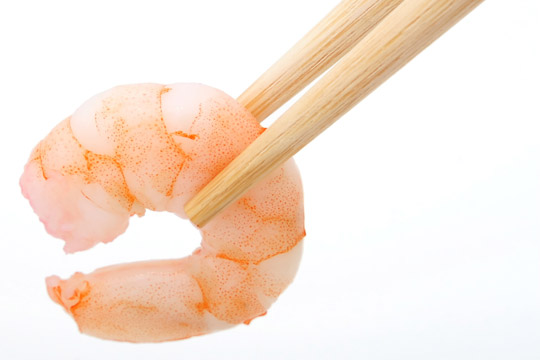
Reducing Food Waste in Foodservice
October 16, 2018 by Doreen Garelick, Dietetic Intern
Our intern Doreen attended a food waste summit for restaurants and compiled these tips to help food service operators redirect…
Nutrition 101
February 5, 2013

Culinary Nutritionist Jason Lau and Dietetic Intern Kelly Borg dispel the myth that lobster and shrimp can be overly detrimental to heart health.
February is American Heart Month and -- as we all know -- cardiovascular disease is one of the leading causes of death in the United States. Over the past couple of decades, shellfish has been associated with high levels of cholesterol, which has led many health-conscious Americans to reduce their consumption of shellfish. But is shrimp and lobster really bad for your heart?
Monitoring cholesterol has become important because it is a controllable risk factor for cardiovascular health. However, the real issue lies in understanding the definition of cholesterol. There are generally two types of cholesterol floating in our bloodstream: the “good” (HDL) cholesterol and the “bad” (LDL) cholesterol. Although it might seem smart to look at the amount of cholesterol you eat -- especially if you have diabetes -- dietary cholesterol only contributes to about 25% of the cholesterol in your body. About 75% of your blood cholesterol is produced by the liver after consuming saturated “bad” fats, meaning it’s much more important to concern yourself with fatty foods than those which are high in cholesterol.
Shellfish contains a variety of chemicals called sterols, and cholesterols are under the umbrella of this chemical group. In the 90’s, scientists found it difficult to distinguish between different sterols and as a result, all of them were mistakenly labeled as “cholesterol”. Therefore, the amount of cholesterol in shellfish was overestimated. In reality, shellfish actually contains less cholesterol than meat or poultry.
Next, not all cholesterol is “bad”. The body needs cholesterol in order to perform certain functions. For example, it is one of the main components used to build cell walls and it also makes bile that helps emulsify fats for digestion and absorption purposes. Moreover, cholesterol helps with the synthesis of vitamin D and many other hormones, such as estrogen and testosterone.
Shellfish not only contains a low level of the unhealthy fats, but also typically boasts a high level of essential vitamins and minerals such as vitamin B12, selenium and zinc. So the next time you visit your local market, feel free to reach out for the shrimp, clams or lobsters, and start incorporating these treasures from the sea into your diet.

October 16, 2018 by Doreen Garelick, Dietetic Intern
Our intern Doreen attended a food waste summit for restaurants and compiled these tips to help food service operators redirect food waste from landfills.
Nutrition 101

Nutrition 101
September 26, 2018 by Doreen Garelick, Dietetic Intern
Ever notice headlines about rapid weightloss? Dietetic Intern Doreen Garelick looks deeper into a recent eye-catching headline to see if there's any truth behind it.
Connect
 Follow us on Twitter
Follow us on Twitter Friend us on Facebook
Friend us on Facebook Follow us on Pinterest
Follow us on Pinterest Follow us on Instagram
Follow us on Instagram Read our Blog
Read our Blog Watch videos on YouTube
Watch videos on YouTube Watch videos on Vimeo
Watch videos on Vimeo Connect with us on Linkedin
Connect with us on Linkedin Find us on Foursquare
Find us on Foursquare
Tweets by @SPEcertifiedBlog Search
Categories
SPE Certified Newsletter
Sign up for news on the latest SPE-certified venues, events and SPE updates.
We will never share your personal information with a third party.